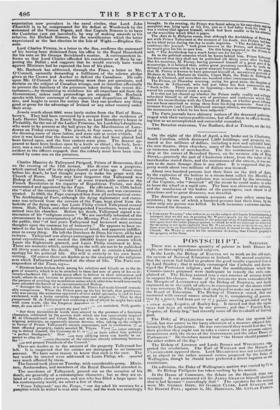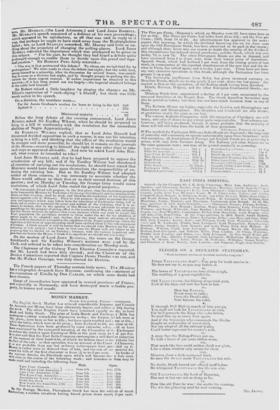POSTSCRI PT
SATURDAY.
• There was a monstrous quantity of palaver in both Houses last night, on thoroughly exhausted subjects.
In the Lords, the Bishop of EXETER set to work on his old topic, the system of National Education in Ireland. lie moved resolutions, that the system bud failed to produce the good results expected from it by Lord Stanley; that it unduly encouraged the Catholic and discou- raged the Protestant religion ; and that the tnodifications which the Commis,ionera proposed were inadequate to remedy the evils corn. plained of. The Bishop entered into a vast number of minute details to support his charges. Some of his statements were contradicted by the Marquis of LANSDOWNE and the Bishop of NoitwIcii, and doubt expressed as to the truth of others' in consequence of the means which it was notorious Dr. Phillpotts had employed to make out a case against the Hoard of Education. The Bishop of NORWICH stated, that Oat • memorial with several names attached to it, complaining of persecu- tion by a priest, had been got tit.1 D.! pue meeting presided oier by atrleir wog, Esquire, of Rauley.beg. It turned out that the signs. tures had been all written by one person ; and that " Patrick King, Esquire, of Runly.beg," had recently come off the tssadmill of Galway gaol. The Duk.e a WELLINGTON was Of opinion that the system
had-
!eâ. but was averse to the hasty alteration of a measure adopted deli. berately by the Legislature. He was convinced they would feel that "in their position they ought not to take a course upon the present subject inconsistent with the views of the Government and the other House of Parliament." lie therefore moved that "the House should proceed to' the other orders of the day." The Bishop of LONDON and Lords RODEN and WINCHILSEA sot ported tile resolutions. The Earl of WicitLow and the Marquis at Cut NRICARDE opposed them. Lord MELBOURNE was not so fastidious as to object to the rather unusual course proposed by the Duke of Wellington, though he should have preferred a direct negative on the
resolutions.
On a division, the Duke of Wellington's motion was carried by71 te 26. So Bishop Phillpotts has taken nothing by his motion. In the House of Commons, the debate on the Hawick riots was resumed. It was protracted till Sir James GRAHAM himself admitted that it had become "exceedingly dull." The speakers for the motios Were Mr. GEORGE HOPE, Sir GEORGE CLERK, Lord STANLEY, and Sir ROBERT PEEL; against it, Mr. HORSMAN, Mr. CUTLAR FERGUS.
••••••••
, MURRAY, (the Lord Advocate,) and Lord JOHN RUSSELL.
1t (RAY'S speech consisted of a defence of his own proceedings; which appeared to be satisfactory, as all that was said in reply to it
that s perhaps he ought to have staid away from the Roxburghsbire wa, ballott; hut, as Lord STANLEY remarked, Mr. Murray said little or no. thing about the propriety of changing the polling-places. Lord JOHN RUSSELL ridiculed the importance which was attempted to be given to this subject. " For his part, he thought they had heard a debate quite prolonged enough to enable them to decide upon this grand and imps. rid question." Sir ROBERT PEEL fairly retorted- 4, Who was it that protracted this debate? To whom are we indebted for its prolongation? We were ready to close the debate last night ; but the noble lord, ;fflaog himself in a minority, after its discussion for several hours, was unwil- fiagto come to a division last night, and he thought proper to prolong the dis- ciusson for those cogent reasons. If undue importance be attached to this quertion—if it has been meted out too largely—the imperial etandard belongs to the noble lord himself."
Sir Robert raised a little laughter by ringing the changes on Mr. Elliott's expression of " cock-shying" a Sheriff; but there was little worth notice in his speech.
On a division, the numbers were— For Sir James Graham's motion for leave to bring in the bill .2.750
Against it 12 Ministerial majority 22 Before the long debate of the evening commenced, Lord JOHN RUSSELL asked Sir Eardley Wilmot, when he should be prepared to bring in a bill in conformity with the resolution for the immediate abolition of Negro Apprenticeship ?
Sir EARDLEY WILMOT replied, that as Lord John Russell had threatened decided opposition to such a course, it was not his intention
to bring in a bill; and thinking that the effect of the resolution would be stronger and more powerful, he should let it remain on the journals of the House—reserving to himself the right at any other time to take such steps as appeared advisable. And now he asked Lord John Rus- sell, what course he intended to take?
Lord JOHN RUSSELL said, that he had been prepared to oppose the introduction of any bill ; and if Sir Eardley Wilmot had abandoned all intention of carrying out his resolutions, he should have stated that Ministers would have taken upon themselves the responsibility of en- forcing the existing law. But as Sir Eardley Wilmot had adopted neither of these courses, it was necessary to ascertain whether the House would adhere to their first or to their second decision of this question; and on Monday or Tuesday, Sir George Grey would move resolutions, of which Lord John stated the general purport_ ° My honourable friend will propose, in the first place, thut the resolution proposed by the honourable Mentber for Yorkshire (Sir George Strickland) out Om decision oil he House on that occasion, shell be read, and likewise the resolution of the honourable baronet opposite (Sir E. Wilmot). Then be will propose, in order to prevent the Hu. nous cote.tspiences which may follow from the inteutions of Parliament being left in doubt, sod in order to maintain the peace and welfare of the Colonies, that it is ne. estuary to declare, that in the opinion of this House it is not advisable to adopt any proeeediugs tot the purpose of giving effect to the resolution of May 22; and, secondly, Slid t this House declares its opinion that every measure which can tend to secure the Negro population the 'privileges secured to them under the act for the abolition of slavery ought to be adopted; and, further, that the most anxious attention of this House shall he directed to strengthen the condition of the Negro 'amulet ion, when the elpiration of the term of apptenticeship skull have entitled them to the full enjoyment of freedom. I think myself it will be better that we shoeld take Monday for the con- eideration of this subject ; but I hope in that Case Ow House will not object to my propcoing that we should sit on Tuesday ; because, with the various in portant sub. jotts that are before the House, 1 think it is expedient we should not lose a day."
On the motion of Lord Joms RUSSELL, the votes on Sir George Strickland's and Sir Eardley Wilinot's motions were rt ad by the Clerk, and ordered to be taken into consideration on Monday next.
The Chairman of the Galway Town Election Committre reported, that Mr. Lynch had been duly elected ; and the Chairn.an of the Devizes Committee reported that Captain Deans Dundus m as not, and that Mr. Walker Ileneage, was duly elected for Devizes.



























 Previous page
Previous page